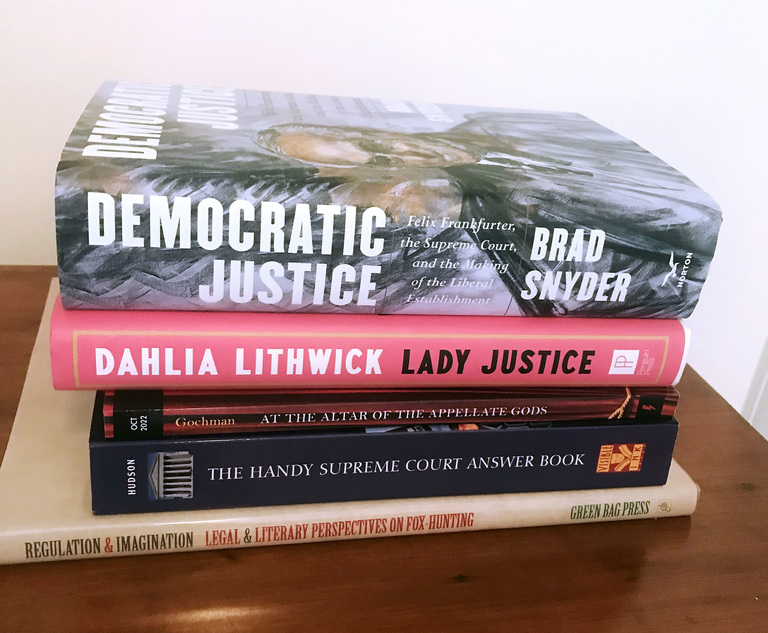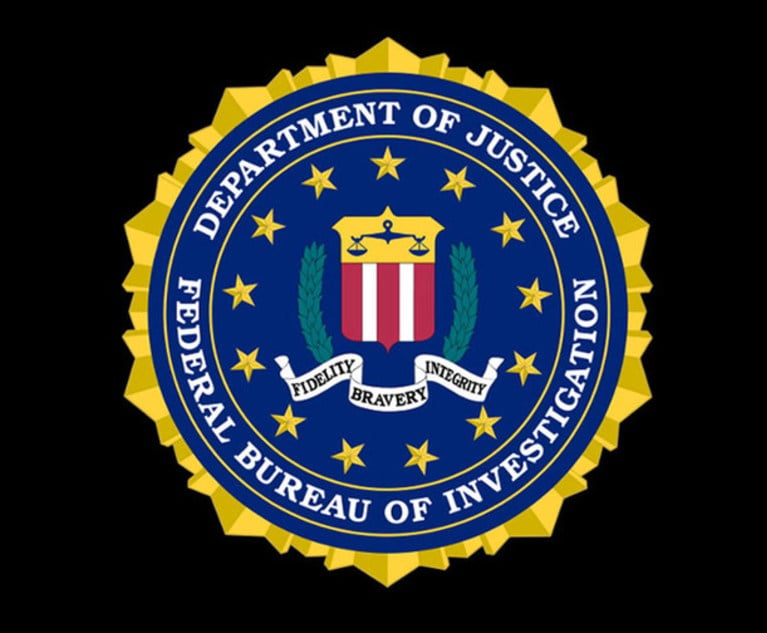 Photo: Tony Mauro/ALM
Photo: Tony Mauro/ALM The Marble Palace Blog: New SCOTUS Books Coming In Over the Transom
As the Supreme Court's new term begins, some important new books about the court have arrived.
October 14, 2022 at 11:22 AM
6 minute read
Thank you for reading The Marble Palace Blog, which I hope will inform and surprise you about the Supreme Court of the United States. My name is Tony Mauro. I've covered the Supreme Court since 1979 and for ALM since 2000. I semiretired in 2019, but I am still fascinated by the high court. I'll welcome any tips or suggestions for topics to write about. You can reach me at [email protected].
For some reason, there has been a torrent of Supreme Court-related books in recent months, as well as some books that are one or more steps removed from the subject. There have been so many books that it has been difficult to read them all, or even a few. (Yes, I'm guilty.)
So below is a brief rundown of recent books that are likely to be worth reading by Supreme Court aficionados and advocates. Please let me know if I've missed any. Thanks:
By Brad Snyder, Georgetown law professor and author of several other Supreme Court books. Blurb: "The conventional wisdom is that Felix Frankfurter was a liberal lawyer who became―surprisingly―a conservative justice. Brad Snyder's spellbinding biography brilliantly revises this understanding to present Frankfurter as a champion of democracy in his day―and for our own as well."
By Dahlia Lithwick and Nina Totenberg, consecutively. I put them together because they have a lot in common: a) Decades worth of amazing, immeasurable reporting about the Supreme Court. b) I have been a huge fan of both of them since the day I met them at the Supreme Court press room decades ago. c) Their books came out last month and both have already made bestseller lists, deservedly so. d) Both are must-reads, without a doubt.
Persuading the Supreme Court: The Significance of Briefs in Judicial Decisionmaking.
By political science professors Morgan Hazleton at St. Louis University and Rachael Hinkle at University at Buffalo. Blurb: "It is not surprising that parties and outside individuals and interest groups invest an estimated $25 million to $50 million a year to produce roughly one thousand amicus briefs to communicate information to the justices, seeking to impact these rulings. … Persuading the Supreme Court leverages the very written arguments submitted to the Court to shed light on both their construction and impact."
By Andrew Seidel, vice president of strategic communications for Americans United for Separation of Church and State. Blurb: "Is a fight against equality and for privilege a fight for religious supremacy? A constitutional attorney dives into the debate on religious liberty, the modern attempt to weaponize religious freedom, and the Supreme Court's role in that 'crusade.'"
Edited by Ross Davies, professor at Antonin Scalia Law School, and editor-in-chief of The Green Bag. Fox hunting may not seem like a Supreme Court story, but Roger Taney (chief justice, 1836-64) was among the politically powerful American fox-hunters of the early Republic. Henry Brockholst Livingston (associate justice, 1807-23) and Smith Thompson (associate justice, 1823-43) are also mentioned.
By Thomas Baker, professor at Florida International University College of Law who served as acting administrative assistant to Chief Justice William H. Rehnquist. I asked Baker who the audience is for the primer, published by the American Bar Association: "Anyone who wants to better understand life behind the red curtains. My law students for sure. But teachers and students from high school on up. The interested person who reads and wonders about the SCOTUS, and the Scotusblog reader whether or not he or she has a J.D."
By David Hudson, law professor at Belmont University and First Amendment fellow at the Freedom Forum. He is author of more than 40 books on subjects ranging from the Supreme Court and the Constitution to boxing, mixed martial arts, golf, horse racing, and basketball. His Supreme Court answer book offers 600 questions, including–hint, hint–what is the nickname of the Supreme Court building?
By Timothy B. Dyk, longtime judge on the U.S. Court of the Federal Circuit, and former law clerk to Chief Justice Earl Warren. Before his judgeship, Dyk had a private practice and a keen interest in the First Amendment. In the book, he tells about the unsuccessful effort to encourage the Supreme Court to allow cameras in the court.
By Alan Mygatt-Tauber, a solo practitioner in appellate law who, among other things, has created popular montages of lawyers who argue before the Supreme Court. He wrote a book about the international law Medellin case as one of the University Press of Kansas landmark law case books that produce a deep dive into individual Supreme Court cases.
By David Enrich, New York Times business investigations editor. As our Law.com colleague Dan Packel puts it, this book "skewers Jones Day, but the legal industry also takes a hit." There are numerous Supreme Court angles in the book, including Supreme Court clerkships.
Justice on the Brink: A Requiem for the Supreme Court
By Linda Greenhouse, Yale Law School lecturer and Pulitzer Prize Winner as Supreme Correspondent for The New York Times. This is an update of her 2021 book of the same title, including happenings from the high court's last term.
On Account of Sex: Ruth Bader Ginsburg and the Making of Gender Equality Law
By Philippa Strum, senior scholar at the Woodrow Wilson International Center for Scholars. The book, published by the University Press of Kansas, is a legal history of Justice Ginsburg's landmark litigation on behalf of women's rights and gender equality.
As a refresher, here are some recent books that have been mentioned in the Marble Palace Blog:
Citizen Justice: The Environmental Legacy of William O. Douglas―Public Advocate and Conservation Champion, a new look at Justice Douglas by M. Margaret McKeown, a judge on the U.S. Court of Appeals for the Ninth Circuit.
At the Altar of the Appellate Gods: Arguing before the US Supreme Court by Lisa Sarnoff Gochman, the compelling story of a first-time advocate before the Supreme Court by Gochman, of the Monmouth County Prosecutor's Office in New Jersey.
Love at Deep Dusk: A Pennsylvania Story, a romance novel, yes a romance novel, by J. Harvey Wilkinson III, judge on the U.S. Court of Appeals for the Fourth Circuit.
NOT FOR REPRINT
© 2025 ALM Global, LLC, All Rights Reserved. Request academic re-use from www.copyright.com. All other uses, submit a request to [email protected]. For more information visit Asset & Logo Licensing.
You Might Like
View All
American Bar Association Calls for Enforceable Supreme Court Ethics Code

What’s at Stake in Supreme Court Case Over Religious Charter School?

Supreme Court Agrees to Hear Lawsuit Over FBI Raid at Wrong House
Law Firms Mentioned
Trending Stories
Who Got The Work
J. Brugh Lower of Gibbons has entered an appearance for industrial equipment supplier Devco Corporation in a pending trademark infringement lawsuit. The suit, accusing the defendant of selling knock-off Graco products, was filed Dec. 18 in New Jersey District Court by Rivkin Radler on behalf of Graco Inc. and Graco Minnesota. The case, assigned to U.S. District Judge Zahid N. Quraishi, is 3:24-cv-11294, Graco Inc. et al v. Devco Corporation.
Who Got The Work
Rebecca Maller-Stein and Kent A. Yalowitz of Arnold & Porter Kaye Scholer have entered their appearances for Hanaco Venture Capital and its executives, Lior Prosor and David Frankel, in a pending securities lawsuit. The action, filed on Dec. 24 in New York Southern District Court by Zell, Aron & Co. on behalf of Goldeneye Advisors, accuses the defendants of negligently and fraudulently managing the plaintiff's $1 million investment. The case, assigned to U.S. District Judge Vernon S. Broderick, is 1:24-cv-09918, Goldeneye Advisors, LLC v. Hanaco Venture Capital, Ltd. et al.
Who Got The Work
Attorneys from A&O Shearman has stepped in as defense counsel for Toronto-Dominion Bank and other defendants in a pending securities class action. The suit, filed Dec. 11 in New York Southern District Court by Bleichmar Fonti & Auld, accuses the defendants of concealing the bank's 'pervasive' deficiencies in regards to its compliance with the Bank Secrecy Act and the quality of its anti-money laundering controls. The case, assigned to U.S. District Judge Arun Subramanian, is 1:24-cv-09445, Gonzalez v. The Toronto-Dominion Bank et al.
Who Got The Work
Crown Castle International, a Pennsylvania company providing shared communications infrastructure, has turned to Luke D. Wolf of Gordon Rees Scully Mansukhani to fend off a pending breach-of-contract lawsuit. The court action, filed Nov. 25 in Michigan Eastern District Court by Hooper Hathaway PC on behalf of The Town Residences LLC, accuses Crown Castle of failing to transfer approximately $30,000 in utility payments from T-Mobile in breach of a roof-top lease and assignment agreement. The case, assigned to U.S. District Judge Susan K. Declercq, is 2:24-cv-13131, The Town Residences LLC v. T-Mobile US, Inc. et al.
Who Got The Work
Wilfred P. Coronato and Daniel M. Schwartz of McCarter & English have stepped in as defense counsel to Electrolux Home Products Inc. in a pending product liability lawsuit. The court action, filed Nov. 26 in New York Eastern District Court by Poulos Lopiccolo PC and Nagel Rice LLP on behalf of David Stern, alleges that the defendant's refrigerators’ drawers and shelving repeatedly break and fall apart within months after purchase. The case, assigned to U.S. District Judge Joan M. Azrack, is 2:24-cv-08204, Stern v. Electrolux Home Products, Inc.
Featured Firms
Law Offices of Gary Martin Hays & Associates, P.C.
(470) 294-1674
Law Offices of Mark E. Salomone
(857) 444-6468
Smith & Hassler
(713) 739-1250









